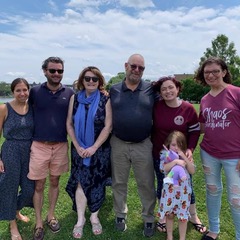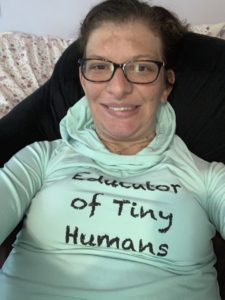By Katy Brieger
Jamie is a 30-year-old preschool teacher of children with autism living in Ardmore, Pennsylvania. In 2018, Jamie unexpectedly received a diagnosis of agenesis of the corpus callosum (ACC). The day of her diagnosis, Jamie knew she would be getting an MRI, but did not know that the result would change the past 28 years of her life.
Jamie walked into the doctor’s office that day to get an MRI for a noncancerous tumor and the neurologist came back to tell her she had ACC. Jamie and her stepmom researched and learned as much as they could about this disorder and suddenly pieces of her childhood started to fall into place.
When asked about her experiences in school Jamie responded, “I have an older brother who is the kid that could take study notes out at 8 o’clock at night before the test, read it once and get an A. I’m the girl who would have to study for a test for a week plus to even get a B. That was always really frustrating,” Jamie said.
Even though things did not come as easy for Jamie as some of the other kids growing up, she says she is happy she did not know she had ACC when she was younger. Not knowing pushed her to go above and beyond because she couldn’t rely on the mentality of “well it’s okay because I’m different.” Not only was she able to push herself in high school, Jamie graduated college with honors.
When asked to describe the way ACC affected her Jamie said, “My therapist explained it to me like this: If you have a gas tank and every morning you wake up, you have a full tank of gas. I wake up every morning with like three-fourths of a tank of gas. So, I’m already starting with less. Going to work and having to function and make all those decisions, that takes a half a tank of gas, where it would only take you a fourth,” said Jamie.
Jamie shared one of her biggest challenges growing up was learning to drive. For most teenagers learning to drive, they’re nervous, maybe a little scared, but overall eager to get their license and their freedom. Jamie was more than just nervous, she truly hated driving. For Jamie, tasks like remembering which pedal was brake and gas, remembering to drive on the right side of the road, breaking at stop signs all seemed impossible to grasp. Trying to hold on to such little details seemed daunting.
Her parents decided to hire the school’s driving teacher to help. “The driving instructor literally looked at them at one point and said ‘I can’t do anything else for her. I’ve done everything I can do, like I can’t do anything else,’” said Jamie. Eventually, after two attempts, she got her license. Now she’s working on remembering specific directions.
Becoming a teacher wasn’t an easy task either. Jamie had tried a few different schools, but they didn’t click. She almost decided to stop teaching all together but instead she reminded herself that she was passionate about teaching children and decided to keep going. Jamie now teaches preschoolers with autism and is working towards her master’s degree. She said being a teacher for students with disabilities wasn’t originally her plan. Jamie knew she wanted to follow in her mother’s footsteps, especially once she passed away, to become a teacher. It wasn’t until there were two children playing on the playground together, one with and one without a disability, that she decided she wanted to be able to teach a more diverse group of children.
“This is how we make a world that understands differences,” said Jamie.
Jamie is aware that she is “different” and has recently been able to confidently accept her differences. There are certain things Jamie does to cope with her ACC, but she continues to push herself. She has been able to see others’ differences and is passionate about inclusivity and empathy.
“This is how we take a world that says, ‘you’re different, I can’t be friends with you,’ and make you say ‘no you’re different and I want to be friends’ because that doesn’t mean anything to me.”
This story is part of the Adults with DCC series that showcases the abilities and lives of real adults living with disorders of the corpus callosum. Students at The University of Texas at Arlington interviewed and wrote stories for this series.



